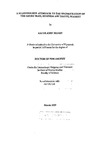Stakeholder approach to the segmentation of the short haul business air travel market
| dc.contributor.supervisor | Gray, Richard | |
| dc.contributor.author | Mason, Keith John | |
| dc.contributor.other | Faculty of Science and Engineering | en_US |
| dc.date.accessioned | 2011-05-13T09:10:49Z | |
| dc.date.available | 2011-05-13T09:10:49Z | |
| dc.date.issued | 1995 | |
| dc.identifier | Not available | en_US |
| dc.identifier.uri | http://hdl.handle.net/10026.1/450 | |
| dc.description.abstract |
The marketing literature deals inadequately with markets which show characteristics of both consumer and industrial markets. In this work such markets are called hybrid markets. The research attempts to find an appropriate research approach for the short haul business related air travel market, which has hybrid market characteristics. Recent studies of the business travel market (Stephenson and Fox, 1987, Toh and Hu. 1988 and 1990) have investigated corporate and traveller attitude towards frequent flier programmes (see Glossary). However, as yet the airline marketing literature has not investigated the role the purchasing organisation (the employer of the traveller) has to play in a decision to purchase business related air travel. Market segmentation is selected as a suitable tool to investigate the business travel market. However, a review of the literature on segmentation for both consumer and industrial products reveals that an approach suited to the characteristics of this market is not available. Consequently a two stage research approach for hybrid markets is developed. A case study of nine companies in the first stage of the research is used to develop an understanding of corporate involvement in the purchase of business air travel, and identifies three key stakeholder groups in the purchase. They are the traveller, the travel organiser, and the "organisation". The second stage of the research collects data on the stakeholders. Traveller data on the importance of product elements in the purchase are used in a benefit segmentation of the market. The attitude data from 827 business travellers is analysed by factor analysis to identify six principal purchase benefits. These six benefits account for 60.6% of the variance in the data. Six factor scores for each respondent are calculated and then investigated by ak means iterative partitioning cluster analysis. A robust three cluster solution is discovered; i. e. three benefit segments are present in the short haul business travel market, based on traveller attitude. Cross-validation tests are carried out to test the stability of this solution. The three segments are investigated to evaluate the influence in the purchase decision of other organisational stakeholders. Differences between segments are found in the travel policy of the employing organisation, class of travel allowed to travellers, and purchase behaviour. The research indicates that for hybrid markets such as business travel, the role of the employing organisation may be important in purchase decisions. Consequently, it is recommended that future reserach should assess corporate involvement in purchases of products that have both consumer and industrial elements. The evaluation of the influences of various stakeholder groups in purchase decisions in hybrid markets may reveal previously overlooked marketing opportunities. | en_US |
| dc.description.sponsorship | The Institute of Marine Studies, University of Plymouth; Air UK Ltd. | en_US |
| dc.language.iso | en | en_US |
| dc.publisher | University of Plymouth | en_US |
| dc.title | Stakeholder approach to the segmentation of the short haul business air travel market | en_US |
| dc.type | Thesis | |
| dc.identifier.doi | http://dx.doi.org/10.24382/3927 |
Files in this item
This item appears in the following Collection(s)
-
01 Research Theses Main Collection
Research Theses Main


